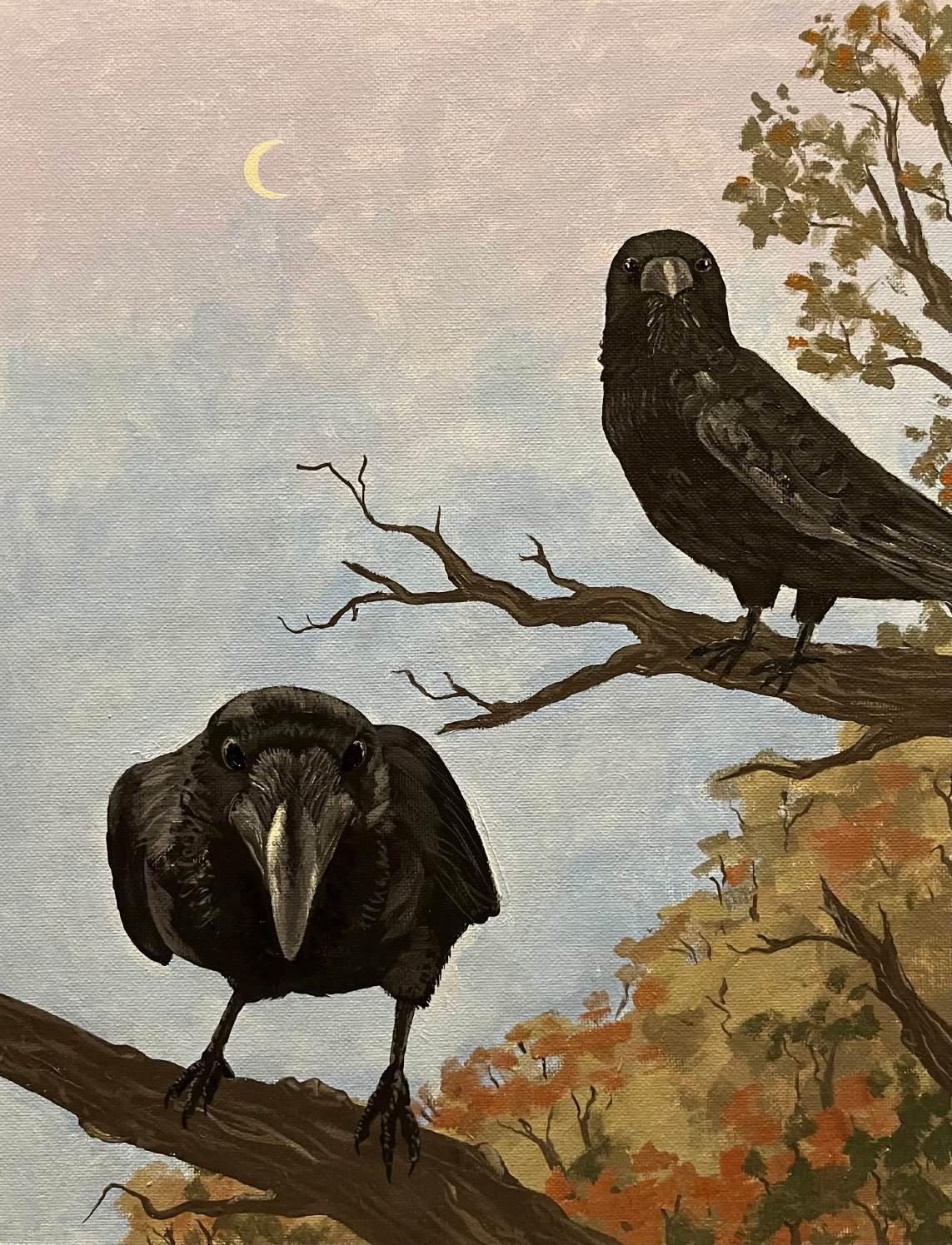
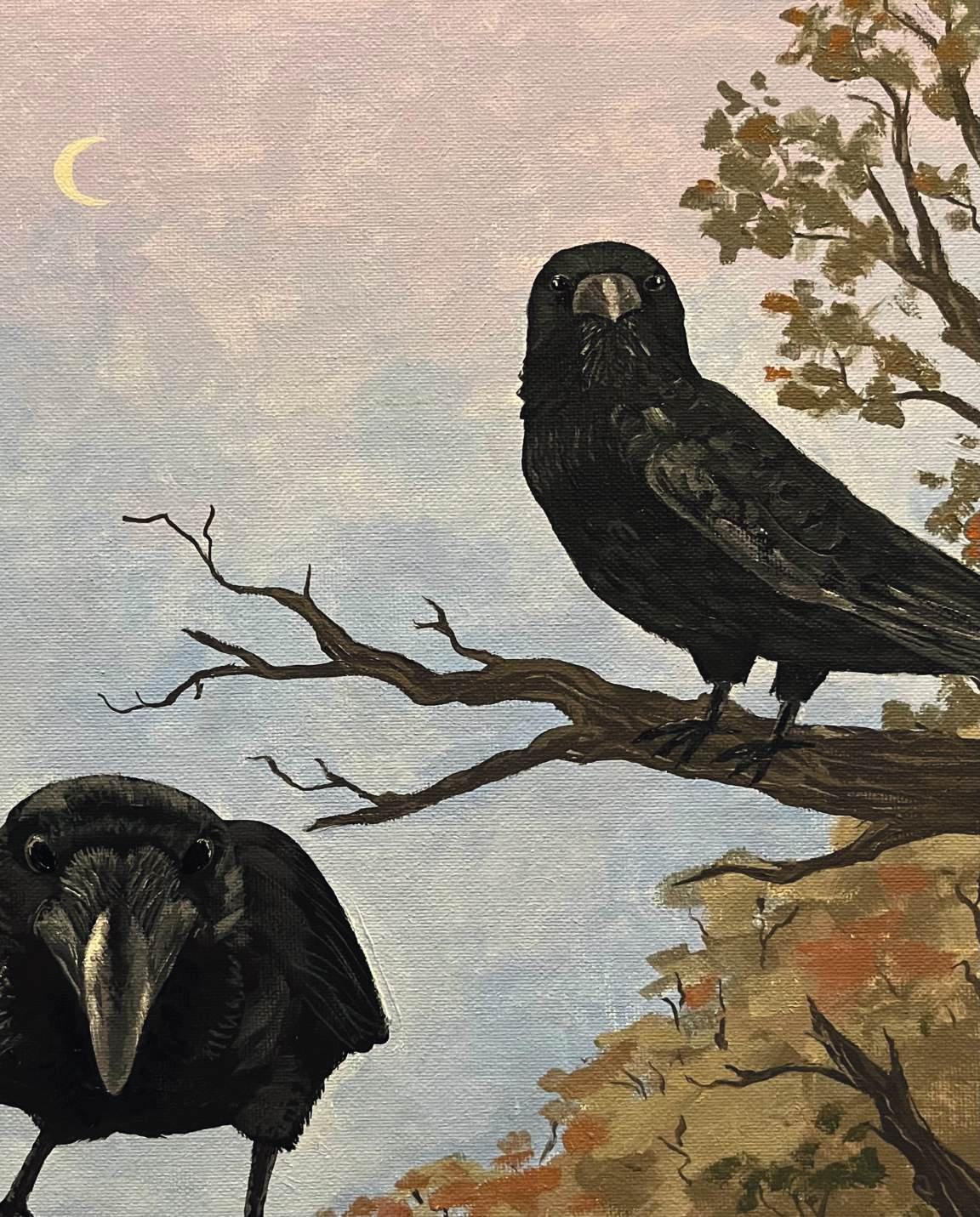



Dear Reader,
You can’t control your surroundings. It’s the weight of the stories told at the dinner table and the house we are born into. It’s the people you grew up around and the di culties you faced along the way. Sometimes it feels like a burden—other times, it is the gi propelling us forward.
When we came to Del Norte for the rst time as freshmen, we were amazed by the diverse community, variety of clubs, and di erent experiences that come together to create such a lively atmosphere. Our campus was a place where, no matter the circumstances you were born into, it mattered more what you made of those circumstances.
As we turn the page to another chapter of our lives, we face a similar situation of uncertainty and opportunity. College students embrace the new adventures that lie ahead. Each student in high school is stepping into the shoes of those they previously looked up to. Incoming freshmen carry the experiences from their past schools. They arrive unsure of their future, but hold the potential to carve their own path.
This issue, put together by all the talented students in The Featheralist, is a compilation of poems, essays, photography, and art that represents this theme of reshaping our past experiences to explore our future.
As we worked on this issue, we found ourselves returning to the question of what we carry with us, and what we choose to leave behind. Our inheritance isn’t always overt, but it always exists. It is woven into our experiences, the stories we tell, and the choices we make. Though our past may be set in stone, we are now the sculptors: what we choose to etch will shape what we pass on.
Samhita Lagisetti and Saanvi Dogra Co-Presidents, Editor-in-Chiefs

02 I WONDER by Cindy Liang, ‘26
“Chinese Ink Bird” by Evelyn Wang, ‘27 Digital
03 WHAT IS MEMORY by Joann Xie, ‘27
“ephemeral” by Kaitlyn Ho, ‘25 Mixed Media
04
TIME CAPSULE by Kaitlyn Ho, ‘25
“Stuck in Time” by Chloe Kang, '26 Digital
05
ECHOES OF TOMORROW by Katherine Chen, ‘27
“Light in Cracked Earth” by Sophie Tran, ‘26 Digital
06
AS PETALS BLOOM AGAIN by Evelyn Wang, ‘27
“Blooming Petals” and “Growth” by Ela Efe, ‘27 Digital
07
SEABIRD by Sophie Cao, ‘26
WORDS FROM ANOTHER TIME
“diner” by Rayne Huang, ‘26 Digital by Grace Ye, ‘27
“daydream.” by Emily Capua, ‘27 Digital
10
THE PRIORITIES OF RHODE ISLAND'S NEXT GOVERNOR by Khloe Louie, ‘27
“Providence” by Ananya AR, ‘27 Digital
12
THE UNSEEN STRUGGLES by Saanvi Dogra, ‘26
“Stoop” by Kate Xu, ‘25 Photography
13 CONTRIBUTORS AND COLOPHON
Written by Cindy Liang, ‘26 | Designed by Karly Prasouvo, ‘26
I wonder if in a past life I once dreamed of a world where water was gold and the thin gruel that built my bones was enough to call a fortune. I wonder if the water that pruned and ridged my ngers could count the valleys between my ribs and unearth the prosperity from under my lungs before I learned to breathe.
I wonder if the breath that exhales my words is the same gust of air in the wind that rips my voice from my lungs. I wonder if the wispy willowy characters of 女 (woman’s script) are enough to tell the world of my existence. My characters are slender, like they are timid to take up space, cramped like an embryo in a womb. In the womb, we could be anything. Perhaps my mother’s conception of her unborn child is incomprehensible. In the end, I am a sapling, too weak in spirit to face the complexities of womanhood and societal constraints.

I wonder if my mother watched me like the (birds) in spring, waiting for my pin-needle feathers sprout until she found she didn’t have the courage to shove me towards a freedom she never had. Perhaps my mother cut her umbilical cord too late, and it shipwrecked itself in the negative curve of my throat, tethering me to ightless birds and aborted butter ies. We cage ourselves in broken twigs and twisted ight feathers. In the end, I am truly my mother’s daughter.
Chinese Ink Bird
Evelyn
Wang, ‘27
Digital

I wonder if I once bound my waist in phoenix feathers and silk, veiled my corpse-to-be in a make-believe paladin, and sold my blood to dye our legacy red enough for our ancestors to glimpse from heaven. I wonder if my bones are powdered white enough to match a noble lady’s face, or if the yellowed cavity of could-have-been and had-to-be rotted me on the inside. In the end, I will never break free from the weight of heritage.
I wonder if my ngerprint is as unique as my worry-bitten lips or a signature, never to be used. If the curve of a cupid’s bow is enough to press ink onto papyrus and words into air. I wonder if the curve of 女 (female) is enough to symbolize the arch of an eyebrow and the pucker of a kiss, enough for a woman to bear a son as hard-mouthed and at and unyielding as she is voiceless. In the end, I struggle between tradition and self.
Silence is virtue Escape only to dreamscapes Living in pretense
● 女 was a secret script used by Chinese women to communicate during ancient times when they were banned from becoming literate.
Written by Joann Xie, ‘27 | Designed by Joann Xie, ‘27
glimpses of light, static screens. my eyes wander the room, smeared streaks of black on the whiteboard, gaze lingering on the crinkled artwork pinned to the wall.1
you walk along glowing street lights, father by your side, arm hooked to his elbow. the jacaranda trees have bloomed again, crushed buds smeared across the pavement. inhale the cooling air.2
sit alone under a sha of light, ponder whether time has own by or we have grown forgetful. our rst sound is a cry, joy smeared with sorrow. accept all we can remember.3
another second forgotten4
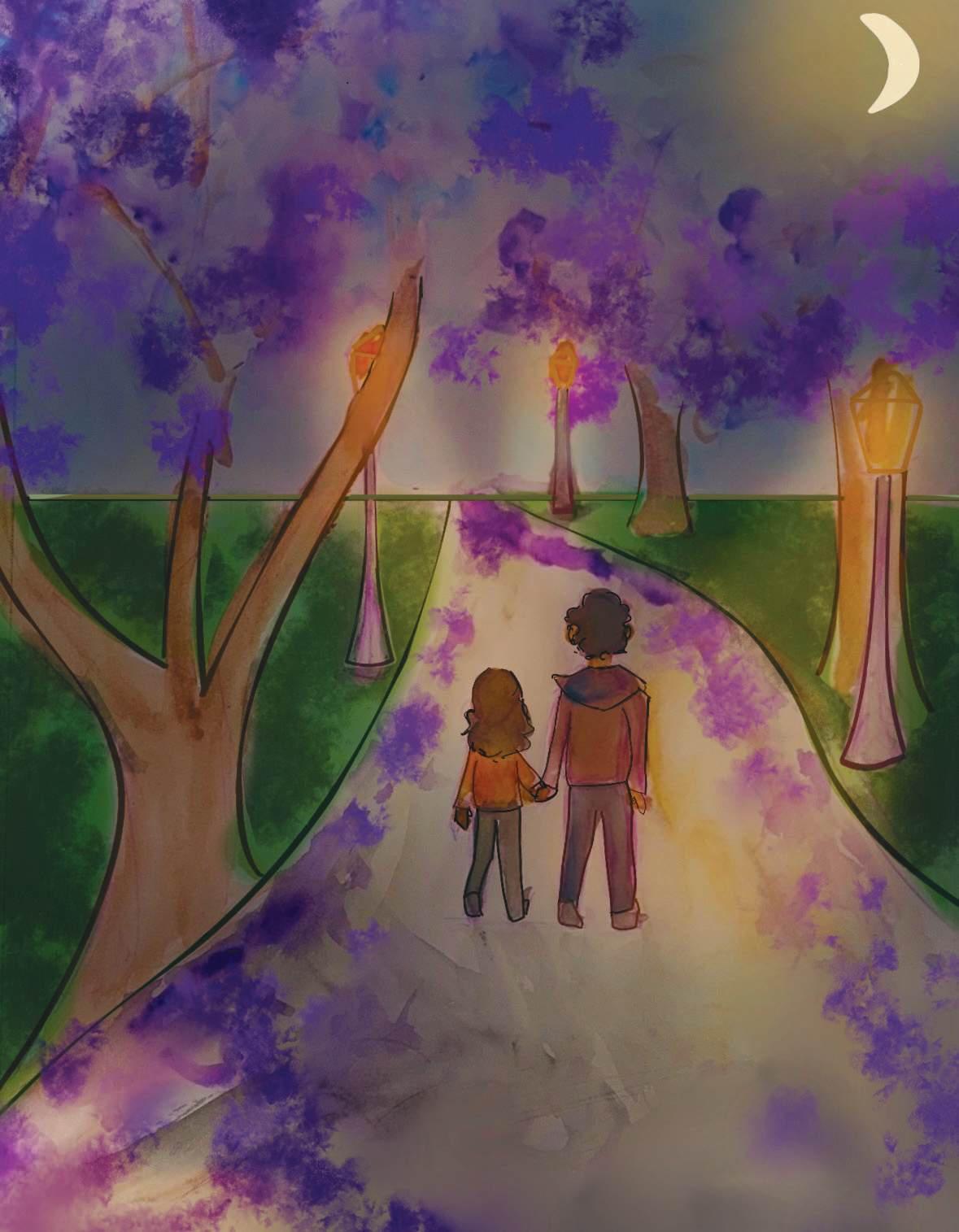
1. Light re ects o blank walls, penetrating my retina. I always wished I could take pictures with my eyes, capture each angle the glares reached my sight. If I could search exact visions we shared, would I nd the feeling of your laughter?
2. In every breeze chilling my face, light leaking in streaks below my pupils, I feel the skin of your heart, sinking with every beat, syncing in each step.
3. We stow what we dread in the skull’s shadows, piling like dust. It infests the thought, distorts our consciousness.
4. in the footnotes of the mind.
media
Written by Kaitlyn Ho, ‘25 | Designed by Angela Chen, ‘25
I believe we are history preserved, paintings observed, wrecks conserved.
When the boats came to take You away, they grabbed thirty rakes To bury our museum Under thirteen thousand clear lakes.
Here, underground, we sing Songs of old, worshipping our hearts To faded red and yellow stripes, Our dated tongues belting our parts.
Orange-tinted tears fall, Drawing bright, ery sunbeams—crowned Both cheeks, twin stripes, watering our Crops sprouting in the ground.
Innocence asks when we Will have mountains for us alone, But experience says Our land was never ours to own.
This bubble in the dirt Is the only replacement for Two million lost voices, Wailing cries stuck in the lapsed war.
Fi y years of dancing; The collars of our áo dài hide The bruises on our necks Where they wished our culture had died.
Although the children no Longer hold the memory of The Frequent Winds of fear, parents Still quell the chill behind their love.
Regret and longing are Bâng khuâng, a phrase that courses through Our yearning to watch the Sun, east of the Paci c blue.
How long can the wood of Our clogs last for? Will we just dance Until our existence dwindles, waiting for freedom’s chance?
Once rediscovered, uncovered, I fear there is no more space for us.
*The immigrant time capsule e ect, also known as the immigrant time warp, is a phenomenon in which immigrants preserve their home country’s culture as it was at the time they le .
**April 30, 2025 marks the 50-year anniversary of the Fall of Saigon.



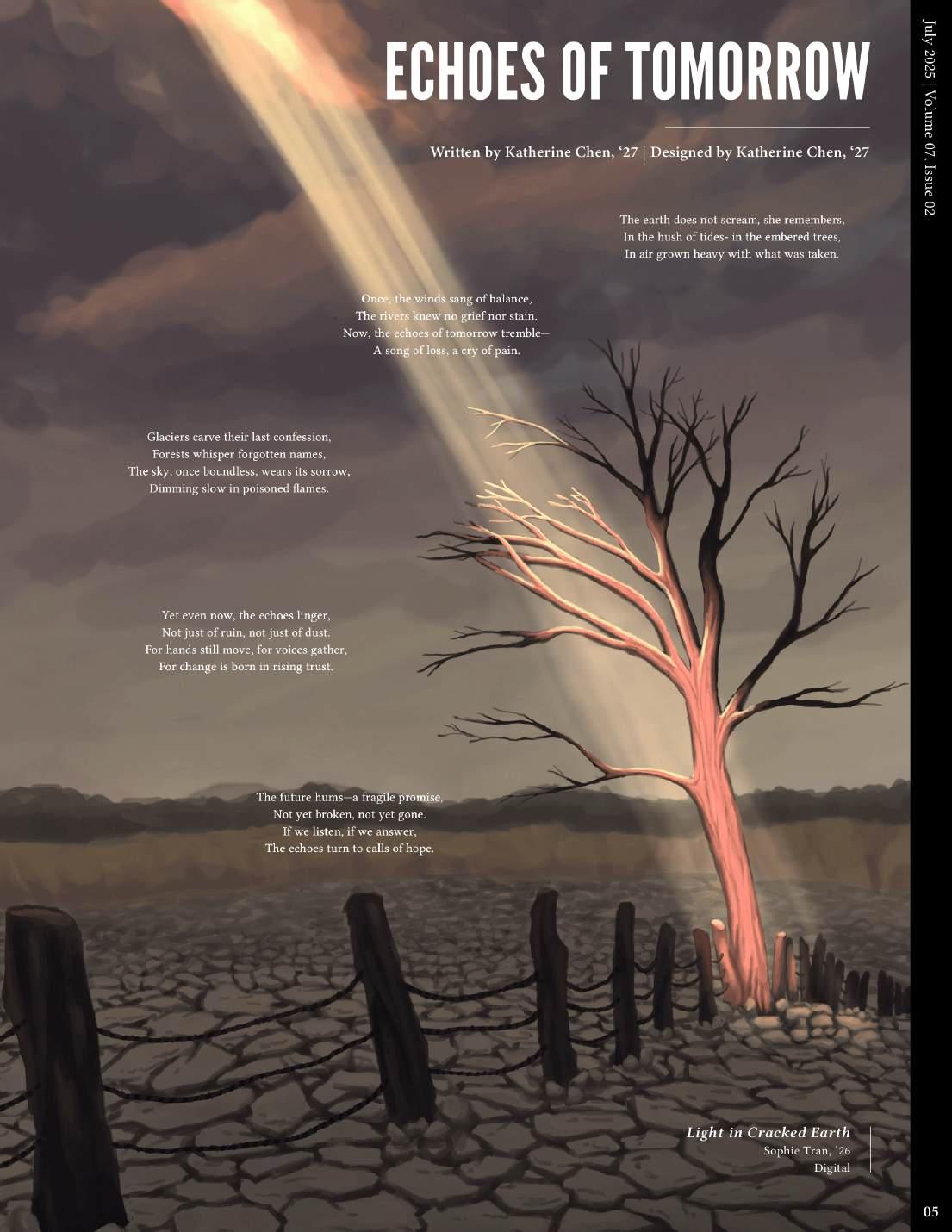
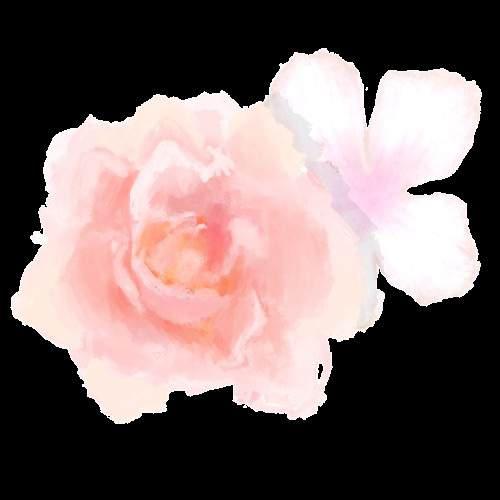
Written by Evelyn Wang, ‘27 | Designed by Olivia Li, ‘27
I have been in this room for too long. Tadpole, tailed-child
Water-breath and long spiral guts.
Caecilians are my brothers, salamanders my sisters, Nephew of newt am I.
From cold white to lush green, Clear springs beckon to me
Nature’s rst green throws a golden light upon my weary face I smell the owers in the air
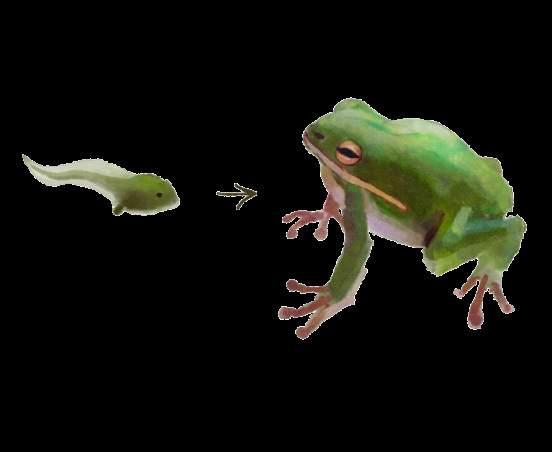
Hind legs longer than my fore We are moving. Here, see how I leap!
My feathers are falling out.
Written by Sophie Cao, ‘26 | Designed by Evelyn Wang, ‘27
It seemed like there was an endless stream of waves under my feet, wind under my wings, and fading sunlight guiding my way. It was pleasant at rst. I could search the waves for a bit and admire the quiet broken up by the crashing of water against stone beaches. But now, the breaking waves only seem to re ect the rumbling in my stomach. Hunger calls out to me like a listless ghost.
When I nally drop down on the pebble shore, there aren’t any other feathers in sight other than my own, which trail behind me in shades of gray. I’d been used to the solitary; weeks out at sea free in the air could do that to a bird. I could recall the song of other seabirds echoing o of smooth stone, but those noises don’t seem to exist here. I wander deeper into the land with aching wings and wobbling feet. The sun sinks into the far oceanline as my fatigue shadows me.
There was no trace of anyone else in the squandered parking lot I walked into. The blinking neon sign, bright against the gaping expanse of tall trees, seems almost blinding. Trash litters the ground in puddles of white and brown.
The hunger calls out to me again, pleading. It begs and begs and my feathers weep from my thinning skin. My steps began to slow, and the scent of sh, mollusks, any range of food I could dream of, envelops me. I take a step further, following my nose towards a blur of white.
I snap a desperate bite at it, the taste bitter and too smooth in my mouth to be tasteful. The hunger roars again, and I try to swallow down the last of whatever I had bitten into. I inhale, longing to smell the delicious aromas once more and distract myself from the plasticky feel. My breathing stutters and my beak opens wider in an attempt to get air into my lungs.
“My feathers are falling out.”
My eyes slowly shut and the neon lights blur in my vision. As my eyes close, I can feel a gentle hand stroking my feathers. The smooth bitterness disappears and my beak can nally shut.
As I open my eyes, the stars dot the sky. I can hear the waves throw themselves angrily against the shore. And the hunger, furious, claws at me.
I stare openly at the hand that cups small, brown pebbles curiously. I poke at it with my beak, and nally, gnaw at it to satiate the glaring hunger. Finally, I am at peace. The hand continues to stroke my weary wings as I fall to the whispers of the night wind and the moon overhead.
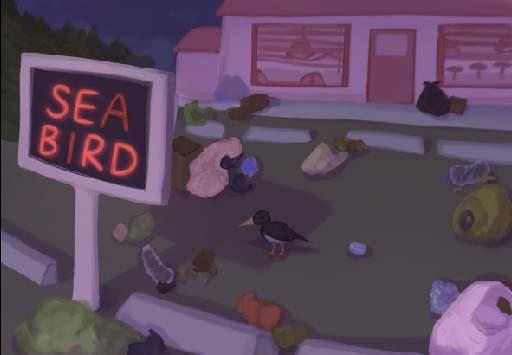
Every day seemed to be the same.
I pass by the same buildings and eat from the same plate, sit in the same classrooms as the same bell rings. When I look up, the clock’s hand has only moved by barely a minute, even though it felt similar to an hour. The better memories quickly y away with the birds on the school roofs, but the old dirt-ridden gum from over three weeks ago is still stuck on the bottom of my sneakers.
The a ernoon sky is typically sunny with just a few u y clouds close to the mountains. Chatter fades as other people walk towards the gates, indecipherable like the background noise of conversation in movies. I didn’t feel like staying inside today, so I waited until the sports teams le and walked over to the cafeteria. It was an unlikely place to sit, usually being the center of overcrowded lunch groups, forgotten wrappers and the occasional ring for ghting. While the tables themselves were still the same, dull blue with several scratches and a few broken pieces, there was something else shining on top of one of them.
What stood out so prominently from the tables was a small box of playing cards, but its appearance was nothing that I’ve ever seen before. The box had no words anywhere, instead displaying a swirly tunnel that changed colors as I held it up to the light. It was also brand new, as if nobody even took the cards out before. I always liked playing cards when I was younger, but it was harder to do so alone. Nobody else was around, and there wasn’t anything else to do now.
The box was a lot heavier than I expected for its size. There weren’t any signs of the circular tape in the front, but it took a lot of e ort to even take the cards out.
They felt so light, almost fragile in my hands, with di erent symbols on each. One looked like my previous pet gold sh from a carnival win when I was six years old, another middle school graduation, another as a simpli ed version of last week’s math test. A card sticking out from the box looked eerily similar to my house.
Written by Grace Ye, ‘27 | Designed by Grace Ye, ‘27
“A card sticking out from the box looked eerily similar to my house.”
When the last card that I found turned out to be the same tunnel pictured on the box’s cover, a strong wind came over in my direction. Bright, blinding colors of many kinds replaced the cafeteria as I felt something similar to a roller coaster speeding up in full motion, the blurs turning into stars before suddenly stopping.
In a blink, the box of cards in front of me turned into a normal, blue and red set. The sun rose a bit higher and the classmates that le before suddenly appeared again, talking as if they were here for a while. Everything seemed to be normal again until someone called my name, the voice unrecognizable but somehow familiar at the same time.
When the last card that I found turned out to be the same tunnel pictured on the box’s cover, a strong wind came over in my direction. Bright, blinding colors of many kinds replaced the cafeteria as I felt something similar to a roller coaster speeding up in full motion, the blurs turning into stars before suddenly stopping.
In a blink, the box of cards in front of me turned into a normal, blue and red set. The sun rose a bit higher and the classmates that le before suddenly appeared again, talking as if they were here for a while. Everything seemed to be normal again until someone called my name, the voice unrecognizable but somehow familiar at the same time. Daydream.
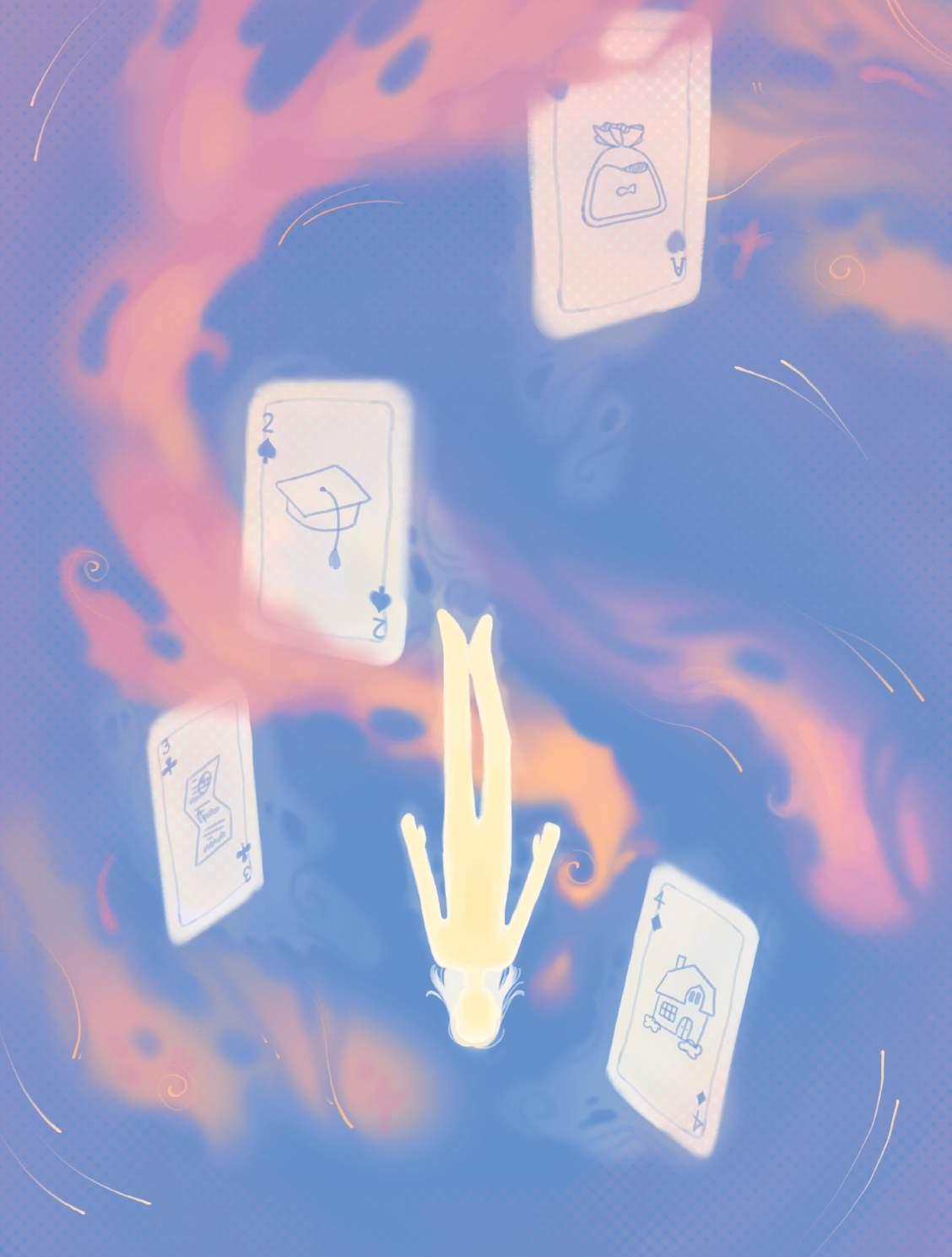
Emily Capua, ‘27
Digital
“Everything seemed to be normal again until someone called my name, the voice unrecognizable but somehow familiar at the same time”
Turning around, I found a friend that I’d le a long time ago. Her hair grew a lot longer compared to the time of our last conversation, darker except for the ends. She was a couple inches taller than me now, and more freckles dotted her tan face and arms. Even her eyes seemed to be a di erent color.
“How did you suddenly get here? I thought you were...gone.” She hesitated before saying the last word.
I was confused. “For how long?”
“Remember how in h grade, you went missing–”
“Didn’t we stop talking a er seventh grade? I might’ve been a bit upset, but I never went missing!”
She looked bewildered. “You seriously forgot? When you tried going through the most dangerous path that we ever heard about...I really tried to help, but you were never seen again.”
My surroundings quickly changed, the concrete ground transforming into a so green meadow with fantastical plants and butter ies. In front of me looked like a typical wooden bridge, but the pieces holding it together started falling o .

I felt a strong urge to cross the unstable bridge to the other side, even though it looked a lot less safe than the one I was in: the landscape was a direct contrast, devoid of life.
There were voices behind yelling at me to not go, saying that doing so was basically asking for the end. Despite knowing that staying back was the more rational choice, I didn’t listen. Something else was telling me to venture into the unknown, despite not knowing what it held.
“Something else was telling me to venture into the unknown, despite not knowing what it held.”
I took a step.
One. Two. Three. Four.
The piece of wood beneath me fell apart before more yelling. The rope was just out of reach.
When I looked down at the valley beneath, it seemed to never end.
Why did I do this?
It was all too much.
I was back at the cafeteria table, the one before taking out the magical set of cards. It was completely quiet except for the distant sounds of the sports teams and the so wind. The box was completely gone as well, and the exact memories of what happened in what I assumed was in another world were slipping away, melting into a clear lesson.
Maybe I should try making more of my life this time.
happening in the rst place. Prison reform helps prevent repeat o enders, but does nothing to stop rst-timers. Thus, crime must be made less appealing. We can start by tackling one type of crime at a time.
Written by Khloe Louie, ‘28 | Designed by Joann Xie, ‘27
A/N: Although this is based on real-life events and references both actual history and recent news, this is mainly a satire of the journalism industry, speci cally local news and their coverage of politics in their areas.
In today’s day and age, the news doesn’t care about YOU. Open up any old news app these days. All they ever talk about are federal government budget cuts, some war going on halfway across the world, and advertisements for a ve-star luxury resort in Senegal. Obviously, the Washington Post doesn’t care what’s going on in OUR community. But we at the Providence Journal are here for you.
Rhode Islanders need to face one fact. Dan McKee is 73 years old, and is running for another term as governor in 2026. He is not expected to face signi cant challenges in the primary, and as Rhode Island is a deep blue state, he will probably win. But hey, this is Rhode Island. You never know. No matter who wins the election, one thing’s for sure: the next governor has a LOT of things they need to do. We asked you guys, the ProJo readers, to tell us what the most important issues are, and over 2,000 of you responded.
Most of you agreed that it is imperative that the next governor supports local businesses. Large corporations have dominated the economy since the Industrial Revolution. Ever since Samuel Slater created his mill in Pawtucket, everyone realized that people just needed one big factory to make things rather than multiple small ones. And now in today’s modern society, you just need one huge Target rather than a bunch of small businesses.
The problem is that Target doesn’t get us. Sure we can get cheap mass-produced merchandise and broken Stanleys with lead leaking out, but that defeats the purpose of Rhode Island. Roger Williams founded our state as a haven for religious dissenters. In simpler terms, people who were di erent. This belief still persists today. We may be bullied by the other New Englanders for our weird food, accents, and size, but at least we stick together. We’ll hang out at any friend’s store because that’s just what we do. By failing to support local businesses you are failing to preserve unique Rhode Island culture, and are thus contributing to the downfall of your own community. A governor must have a deep
knowledge of their state and the people who inhabit it. Do you really think we’re going to become like, say, Massachusetts or New York? Didn’t think so.
ADVERTISEMENT: HELP! We at the ProJo need more money in order to continue serving MetroProv. DONATE TODAY YOU NUTMEGGER.
Another issue Rhode Island faces today is crime. Homicides are up 56% from 2022 to 2023. Our data also shows petty crime, especially purse stealing and pickpocketing, is on the rise. There’s also a group of four Rhode Island Men, which is kind of like Florida Man, but there’s four of them. They do everything from burglary to the and house raids. NBC10 is clearly sick of them. Which is weird given the history of crime in Rhode Island.
In the 1900s, most of the states rati ed the 18th Amendment which started prohibition. Rhode Island said no and thus the Providence Ma a was born. Their crimes were mostly bootlegging and illegally gambling. In the 1950s, Raymond Patriarca became the boss of the crime family. From the Coin-O-Matic tobacco shop, he oversaw everything, including murder, tra cking, and the . And all the regular Rhode Islanders had to deal with it.
Then Buddy Cianci came along and ran for Mayor of Providence on a campaign of anti-corruption. So the Patriarcas were arrested and the Ma a was kinda dead by then. Then Cianci was convicted of labor racketeering and assault. But nobody cared because at least he actually improved Providence’s economy!
Except we Rhode Islanders get bored easily. By 2014 Cianci lost reelection to Jorge Elorza by a landslide. Nobody cares about crime anymore. Nobody wants to get their money, phone, or purse stolen. So why not get rid of all the criminals so nobody has to deal with them?
The Rhode Island government can only use so much money. Much of that must be spent to reform our prisons so that criminals are less likely to reo end. Rather than being punitive, it should function as some sort of reeducation system. Prisoners deserve fundamental human rights like the rest of us. We must also prevent crime from
Rhode Island already has one of the highest car accident rates, because our roads suck, and nobody wants to x those wicked big potholes. That’s why car accidents are on the rise from 39 deaths in 2022 to 61 in 2023. About 58% of those were caused by drunk drivers. The easiest thing to do is tell people not to drink and drive. But no matter how many signs we put up, people don’t listen. In fact, these signs are actively encouraging people to drink and drive, as we’re up from 42% drunk drivers in 2022. If car accident rates are going to keep rising like this, the best thing to do is convert Rhode Island to a carless state. Without cars, the car accident rate and drunk driver rate will decrease to the ideal of 0%.
How could one governor carry this plan out? First, all cars will be instantly banned from entering the state. Everyone will have to sell their cars to out-of-state dealerships within a year. A er doing that, everyone will get from place to place by foot. Providence is already a pedestrian-friendly city because everyone’s just going at their own pace. However, roads will not be completely eliminated. The only vehicles allowed to travel will be those of rst responders, and public transit, such as buses. Drivers must be specially trained to prevent accidents between the few vehicles le . Residents will have to rely on public transit for road trips more than ten miles away. But that’s okay, because public transit will become free for all, as the government can pay for it!
Now, what if people want to leave Rhode Island? Sometimes, you just need to take a vacation. The Purple Line is still swapping tourists between Rhode Island and Massachusetts, despite the constant delays, so that isn’t too much of a worry. The only other state that borders us is Connecticut.
Connecticut? Why would anyone want to go to Connecticut? Nothing interesting ever happens there. They’ve got nothing. Except maybe Yale. And pizza and maybe a scammer or two here or there. But that’s it. New Englanders stop there for gas on the way to New York, and vice versa. Connecticut is stuck in both their shadows. Not quite New York, not quite New England. And if it’s just gonna sit there like that, then Rhode Island’s next governor should just annex it already!
This would bene t Rhode Island in a few ways. By gaining more land, we will be taken more seriously by everyone. One of the main reasons all the other
states bully us is because we’re the smallest state. The only time we’ll show up in the news is as a unit of measure. A er annexing Connecticut, Rhode Island will quadruple in size and gain ve congressional districts, thus leading to more political in uence and greater respect.
Annexing Connecticut will improve our economy, too. Our economy doesn’t really have much going for it, except for tourism, ocean-related stu , and healthcare for whatever reason. By annexing Connecticut, we’ll gain access to their entire insurance and nance industry, creating more jobs and paying o some state taxes. It is important to make sure more Rhode Islanders are insured in case of hurricane destruction.
And nally, annexing Connecticut will help facilitate cultural exchange with New York. While we share a maritime border with them along Long Island Sound, that is not su cient. All you can do across a maritime border is ship goods. Which gets old a er a while. Our semi-secret underground Yankees fandom needs an easier way to travel to the Bronx for home games, and New Yorkers need an easier way out of the hustle and bustle of their city. Nobody wants to be stuck in tra c for eight hours and get scammed by a highway patroller. Connecticut’s roads suck almost as much as ours, so it’s only logical that we annex them and convert them to carlessness too. A er annexing Connecticut, the governor can expand the Purple Line there until it reaches our newly-acquired land border with New York. Then everything will be okay! Even if taking over another state is too much,
there is still another solution: reclaim the land we lost to Massachusetts.
Bristol County has always been a sore spot for Rhode Islanders. At only 25 square miles, and comprising only the towns of Bristol, Barrington, and Warren, it’s America’s third-smallest county and a shell of its former self. Way back in colonial times, Rhode Island used to own what is now Bristol County, Massachusetts, including the towns of Fall River, Seekonk, and New Bedford. But then Massachusetts got mad and stole all of BC. In 1746, Rhode Island shot back, so BCRI was created from parts of BCMA. This issue was set aside during and a er the Revolutionary War, when Rhode Island went through a rogue phase where she refused to ratify the Constitution and give up her independence. A er all that ended she nally sued Massachusetts in 1838. According to a colonial charter, Rhode Island completely owned the land surrounding Narragansett Bay, which includes Bristol County. But the Supreme Court said the charter was invalid and that the current borders were ne.
Even a er 200 years, we still haven’t gotten over it. There are no good reasons for Massachusetts to keep BCMA. It’s already a Rhode Island mini-me. They listen to our radio, shop at our mall, read our news (including us at the ProJo), cheer for our sports teams (RIP PawSox), commute to our businesses, and eat at our Newport Creamery! You can’t truly enjoy an Awful Awful unless you’re a Rhode Islander. Thus, they should just become Rhode Islanders already! They’re even o cially
classi ed by the US Census Bureau as part of MetroProv, which includes the entire state of Rhode Island. This means BCMA is geographically, economically, and culturally closer to Rhode Island than Massachusetts.
Clearly Massachusetts has no interest in managing BCMA, either. Those snobs are so centered around Boston that they don’t have time to take care of anything else. And what do they do when they nally remember BCMA exists? Close down the beloved Seekonk Showcase Cinema, of course! Obviously none of the locals were happy about it.
Especially the people running the Fun 107 radio station. As Rhode Islanders, we have to go up to BCMA o en too. Our familiarity with the area means we get them more than the Boston snobs ever will. Thus, our next governor should take back Bristol County and actually treat them with respect and dignity.
The road to Rhode Island’s governor is not easy, especially with these issues facing our state. But by running on a platform tackling the above issues, our state will rebuild and come back even better.
No, the ProJo is not going to endorse a candidate. Where’d ya get THAT one from, hon?
SEE ALSO
Opinion: Only candidate Providence Pete can x our housing crisis. by Jacques Jacobson
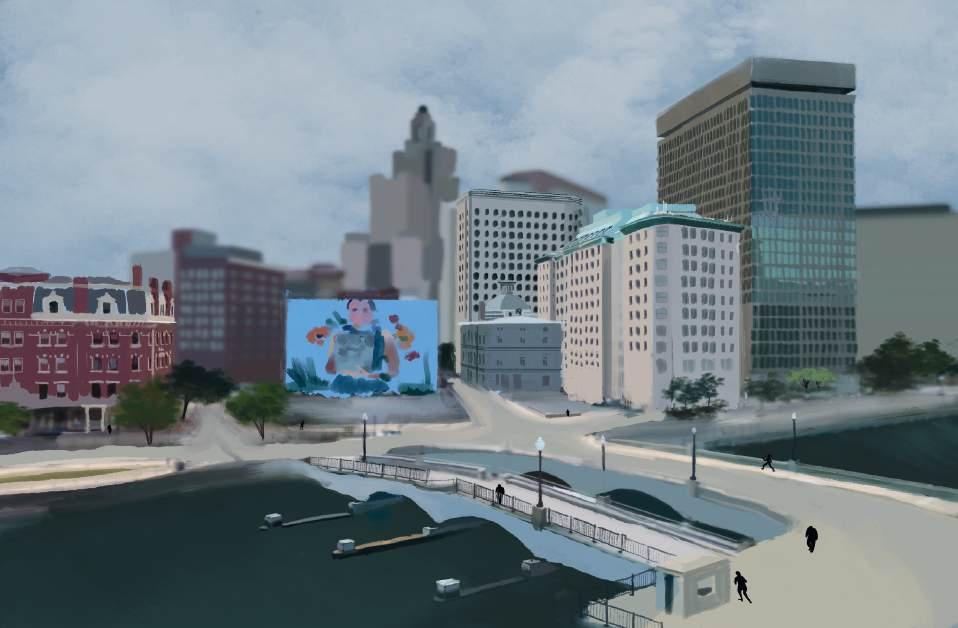
Written by Sanvi Dogra, ‘26 | Designed by Samhita Lagisetti, ‘26
Growing up, I never thought twice about having clean water. Yet, almost two thirds of the world has experienced water scarcity for a long period of time, and the percentage continues to grow. This isn’t a coincidence. It is a direct consequence of climate change. Rising temperatures disturb the delicate balance of our atmosphere, and while this phenomenon upends lives worldwide, one group
The problem doesn’t stop with the economy. Unfortunately, people also take advantage of these events as moments when women and girls are at their most vulnerable. Researchers from the Department of Disease Control have found that climate disasters are linked to a sharp rise in gender-based violence, especially sexual assault and human tra cking. Displaced women are o en
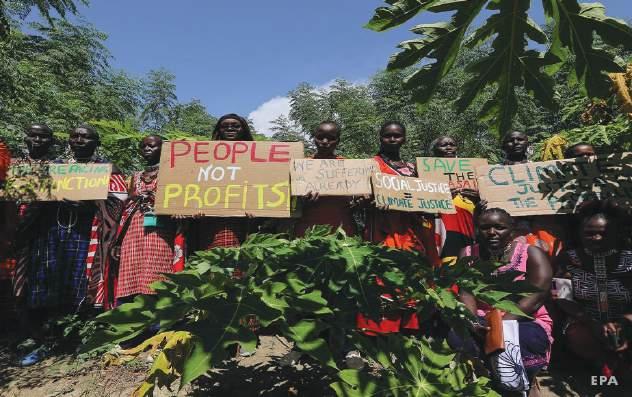
bears a disproportionate burden—women. At rst, this might seem surprising. If climate change a ects everyone, why should women be given special consideration? The truth is that these disasters amplify existing inequalities, making women more vulnerable in ways that are o en invisible. Climate change threatens their health—not just in a medical sense, but in economic security, personal safety, and overall well-being.
One of the main impacts climate change has in widening disparities is on job stability. According to the Food and Agriculture organization, women around the world are typically responsible for securing food, water, and fuel. However, climate change o en causes sporadic rainfall and landslides that eliminate the agriculture system. Girls are required to leave school to gather resources, limiting their prospects at a future job by preventing education and causing excessive stress as the primary caregiver. Even in developed countries like the United States, women are more likely to work in industries a ected by extreme weather—like healthcare, retail, and service jobs—where layo s are common a er disasters. Meanwhile, they are also more o en responsible for taking care of everyone else harmed by the disaster, such as the children and the elderly. Men return to work. Women are forced to rebuild, massively increasing the gender gap.
disoriented, placed in overcrowded shelters, and le without a support system—a situation that predators seek out. The most devastating part? The perpetrator isn’t even a stranger—it’s someone they know. Studies show that 37% of climate-related abuse cases come from current or former intimate partners. Economic abuse sky rockets as men take control of any remaining resources, forcing women into nancial dependen-
cy. A er losing everything to a ood, re, or storm, these women are then stripped of their freedom and safety.
Additionally, climate change directly threatens women’s health—especially reproductive health. Mariama, a musician from Mali, spent years hoping for a child. But in 2024, relentless heatwaves turned her long-awaited pregnancy into a struggle for survival. Frequent power outages le her without relief from the su ocating air, and despite following medical advice, her condition worsened. At six months, she went into early labor. Her baby did not survive. Months later, Mariama’s body faced yet another blow—menopause, years earlier than expected. In a short period of time, climate change robbed her of motherhood. Her story is not an exception. Heat and environmental toxins increase pregnancy risks, accelerate menopause, disrupt hormonal health, and place countless women in danger.
Even today, the World Health Organization says the e ects of climate change on women are massively under-reported. However, this doesn’t have to be our future. While natural disasters disproportionately a ect women, they also present opportunities to empower them. We must invest in climate-resilient education, ensuring that when disasters strike, women have resources to rebuild their lives. Governments must pass policies that protect women from job losses in climate-sensitive sectors. Shelters for displaced people must have better security, trauma support, and legal protections. Crisis intervention programs should be embedded in disaster relief e orts. Studies by the UN show that when women are involved in climate policy, communities recover faster and become more resilient.
Climate change is not just an environmental issue—it is a human rights issue. Let us not be remembered as the generation that watched in silence as women su ered. Let us be remembered as the generation that took action, ampli ed voices, and fought for justice. So let us build a world where no woman is le behind.
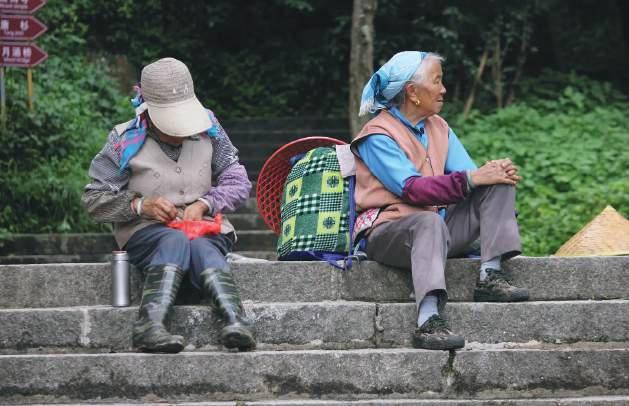
Sta Contributors
Samhita Lagisetti, ‘26 - Co-president/Editor-in-Chief
Saanvi Dogra, ‘26 - Co-president/Editor-in-Chief
Sophie Cao, ‘26 - Vice-president/Deputy Editor-in-Chief
Mandy Hung, ‘27 - Secretary/Editor
Cindy Liang, ‘26 - Board Editor
Katherine Chen, ‘27 - Board Editor
Aliya Tang, ‘25 - Board Editor
Kevin Tran, ‘25 - Board Editor
Chloe Kang, ‘26 - Head of Art
Joann Xie, ‘27 - Co-head of Graphic Design
Olivia Li, ‘27 - Co-head of Graphic Design
Glora Zhai, ‘27 - Treasurer
Advisors
Mr. Thomas Swanson
Dr. Trent Hall
Writers
Kaitlyn Ho, ‘25
Cindy Liang, ‘26
Saanvi Dogra, ‘26
Sophie Cao, ‘26
Grace Ye, ‘27
Joann Xie, ‘27
Katherine Chen, ‘27
Evelyn Wang, ‘27
Khloe Louie, ‘28

Artists
Kaitlyn Ho, ‘25
Raine Huang, ‘26
Chloe Kang, ‘26
Emily Capua, ‘27
Ela Efe, ‘27
Ananya Rajendrababu Anoop, ‘27
Khloe Louie, ‘28
Graphic Designers
Angela Chen, ‘25
Samhita Lagisetti, ‘26
Olivia Li, ‘27
Karly Prasouvo, ‘26
Evelyn Wang, ‘27
Joann Xie, ‘27
Grace Ye, ‘27
The Featheralist, Volume 07, Issue 02
Del Norte High School's Political and Literary magazine. Published on January 19, 2024.
Del Norte High School, 16601 Nighthawk Lane San Diego, CA 92127
Phone: (858) 487-0877
Fax: (858) 487-2443
https://www.powayusd.com/Schools/HS/DNHS
https://dnhshumanities.weebly.com/ dnhshumanities@gmail.com
School Population
2,459 students
153 full-time sta
Font Families
League Gothic (titles)
Oswald (pull quotes)
Libertinus Serif (by lines/body text)
Computer Hardware and So ware Windows 10
MacOS
Adobe Illustrator
Adobe Photoshop
Adobe InDesign
Unseen Struggles
Alston, Margaret. "Gender Mainstreaming and Climate Change." Journal of Human Rights and Social Work, vol. 6, no. 1, 2021, pp. 17–23. PubMed Central (PMC).
Baby, Mariama. "‘This Is Climate Breakdown’: How Global Heating Fuels Con ict in Burkina Faso." The Guardian, 13 Nov. 2024. "Gender and Food Security and Nutrition." Food and Agriculture Organization of the United Nations (FAO).
"Women's Health and Climate Change: A Threat or an Opportunity?" Eastern Mediterranean Health Journal, vol. 30, no. 5, 2024.
The Priorities of Rhode Island's Next Governor "Comparison of Selected Part I Crime by Year Since 2018." Providence Police Department, 21 Jan. 2024.
DaSilva, Melanie. "Study: Rhode Island Ranks #1 for Worst Roads in US." WPRI, 9 Feb. 2023.
"Four Rhode Island Men Arrested in Connection with 43 Burglaries Across Massachusetts." NBC10 WJAR, 26 Apr. 2024.
"Four RI Men Accused of Stealing Millions of Dollars' Worth Vehicles from Dealerships." NBC10 WJAR, 27 Sept. 2024.
"Four Masked Men Raid North Providence Home." NBC10 WJAR, 4 Oct. 2024.
Larson, Doran. "Why Scandinavian Prisons Are Superior." The Atlantic, 24 Sept. 2013.
Paper stock
Cover: 100# Glossy Text
Inside: 80# Glossy Text
We would like to thank our printing company, Best Printing USA, for their steadfast technical support and consistent high quality.
Price of magazine
We rely 100% on local advertisers and student-essay-contest-award money to print our magazines. We print approximately 150 copies per issue depending on page count and distribute copies for free to the Del Norte student body and surrounding community.
Editorial Policy
The Featheralist is produced and managed entirely by members of the synonymous The Featheralist club, an 100% student-run extracurricular club. The Featheralist club members are divided into three distinct but coordinating departments: Writing, Art, and Graphic Design. Each department is led by a small group of student o cers.
The Writing Department collects dra s from both sta and guest writers. Student-led “editing squads” ensure that all articles are publication-ready. The Art Department curates artwork of all subjects, mediums, and styles through methods similar to the Writing
Department. O cers screen all writing and art pieces for school appropriateness. Lastly, the Graphic Design Department combines verbal and visual content together into print-ready spreads.
The positions expressed in any of the articles are solely those of the individual writer(s). They do not represent the viewpoints of The Featheralist, nor those of Del Norte High School or the Poway Uni ed School District.
Mission Statement:
The Featheralist as a club exists to foster a collaborative and mutually edifying community of artists, writers, and graphic designers. We empower students to explore topics spanning the entire spectrum of the humanities — from screenplay to political essay, from poetry to short story. We serve as a megaphone to broadcast students’ unique ideas, experiences, and visions to the entire campus and the larger community.
Scholastic A liations
We are a proud member of the Columbia Student Press Association.
Cover art “Crows” by Alice Tang, ‘23
Alejandro Jodorowsky